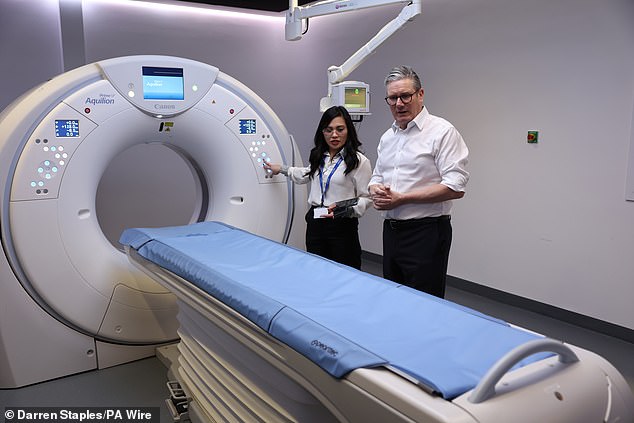The NHS will slash red tape so it can deploy the latest technology faster around the country and end a postcode lottery in care.
Firms will only need to prove the safety and effectiveness of their products once, rather than wasting time making separate submissions to each trust.
Qualifying products will be given an ‘innovator passport’ and added to a new online catalogue where managers can purchase them.
The ‘one stop shop’, named MedTech Compass, aims to get technology into the hands of NHS staff and patients quicker than before.
Details will be included in the government’s Ten Year Health Plan, set to be unveiled on Thursday.
Health secretary Wes Streeting said: ‘For too long, Britain’s leading scientific minds have been held back by needless admin that means suppliers are repeatedly asked for the same data in different formats by different trusts – this is bad for the NHS, patients and bad for business.
‘These innovator passports will save time and reduce duplication, meaning our life sciences sector – a central part of our 10-Year Health Plan – can work hand-in-hand with the health service and make Britain a powerhouse for medical technology.
‘Frustrated patients will no longer have to face a postcode lottery for life-saving products to be introduced in their area and companies will be able to get their technology used across the NHS more easily, creating a health service fit for the future under the Plan for Change.’

Wes Streeting (pictured) said firms will only need to prove the safety and effectiveness of their products once, rather than wasting time making separate submissions to each trust
The passport will be introduced over the next two years and will mean technology that has been robustly assessed by one NHS organisation can easily be rolled out to others.
The Department of Health said this would remove ‘needless bureaucracy’ and create a ‘dynamic best buyer’s guide’, while also helping boost economic growth.
In on example, special wound dressings which are already cutting infections after surgery by 38 per cent at Barking, Havering & Redbridge University Hospitals could be adopted across the country, the Department said.
Meanwhile, at Barts Health Trust in London, the use of antimicrobial protective coverings for cardiac devices have cut infections and saved more than £103,000 per year.
The Department of Health also said rapid flu testing at University Hospitals Dorset has cut the time patients spend in hospital alongside antibiotic use – something that could benefit other hospitals.
MedTech Compass aims to make these innovations, and the evidence underpinning them, clearer to buyers within the NHS.
Dr Vin Diwakar, clinical transformation director at NHS England, said: ‘We’re seeing the impact improvements to technology are having on our everyday lives on everything from smartwatches to fitness trackers – and we want to make sure NHS patients can benefit from the latest medical technology and innovations as well.
‘The new innovator passports will speed up the rollout of new health technology in the NHS which has been proven to be effective, so that patients can benefit from new treatments much sooner.’

The NHS will slash red tape so it can deploy the latest technology faster around the country and end a postcode lottery in care
Daniel Elkeles, chief executive of NHS Providers, which represents NHS trusts said: ‘We welcome any measures which cut red tape and help trusts get proven and effective technology onto the frontline faster to boost patient care and free staff from time-consuming admin.’
Professor Peter Bannister, medtech expert and fellow at the Institution of Engineering and Technology, said: ‘This centralisation and simplification of adoption across the NHS will be welcomed by industry – including both large corporates and innovative UK small businesses – as well as by patients and clinicians.
‘However, there must be clear evidence standards for manufacturers that recognise the diversity and health inequalities of the UK population, while the variation in digital readiness and workforce skills between different healthcare providers must also be factored in.’












